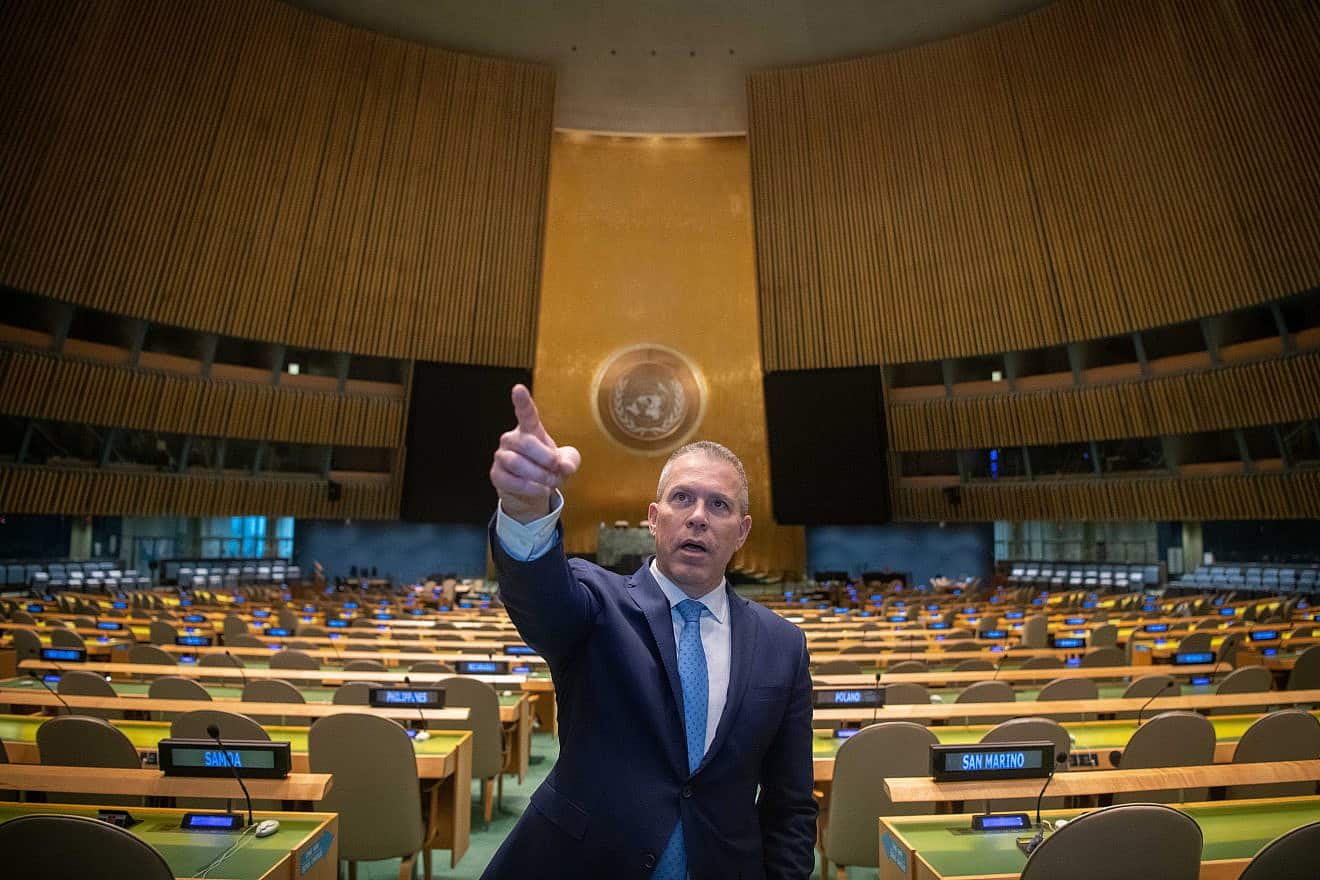This week’s meeting in New York between the leaders of Israel and the United States on the sidelines of the United Nations General Assembly is sure to be a headline-grabber.
But Israel’s ambassador to the United Nations says there are plenty of other reasons to pay attention to the goings-on at the annual High-Level Week at Turtle Bay.
Israeli envoy Gilad Erdan and his Moroccan counterpart Omar Hilale were tasked by the UNGA president with co-facilitating one of the Assembly’s main events this week. Wednesday’s High-level Meeting on Pandemic Prevention, Preparedness and Response, in collaboration with the World Health Organization, will bring together heads of state and government to “adopt a political declaration aimed at mobilizing political will at the national, regional and international levels for pandemic prevention, preparedness and response,” according to the United Nations.
“This is the first time ever that the U.N. will vote on a resolution [at the General Assembly’s High-Level Week] that was co-facilitated by Israel,” Erdan told JNS. “We facilitated and led negotiations with all member states on the political declaration that world leaders are about to adopt.”
The overall theme of the meeting will be “Making the world safer: Creating and maintaining political momentum and solidarity for Pandemic Prevention, Preparedness and Response.” The meeting will consist of an opening segment, a plenary segment for general discussion, two multi-stakeholder panels and a brief closing segment.
Israeli Health Minister Moshe Arbel will deliver a speech at that meeting, according to Erdan.
Israel is credited as one of the leading countries in utilizing data to prevent the spread of COVID-19 during the height of the pandemic.
That same day, Israeli Environmental Protection Minister Idit Silman is slated to take part in the U.N.’s Climate Ambition Summit.
“Minister Silman will highlight Israel’s expertise and our will to contribute to fighting climate change,” said Erdan. “Israel is a world leader in adapting, fighting desertification, water scarcity and food security based on sustainable agriculture. And in addition, the technology that we are developing could help mitigate greenhouse gas emissions.”
Last Tuesday, the Israeli government’s Ministerial Committee on Legislation approved Silman’s climate bill, which, if passed, would put Israel on a path to net zero emissions by 2050, unfreezing progress caused by disagreements among various ministries. The bill also stipulates that greenhouse gas emissions in 2030 will be reduced by 30%, compared to 2015 measurements.
The bill still has to go through several hurdles in the Knesset, including committee passage and three votes. But it does give Silman something in her pocket on the way to Wednesday’s meeting.
An Israeli representative is also set to speak on Monday afternoon at the U.N.’s Sustainable Development Goals Summit. Israel is slotted to speak during a leaders’ dialogue on applying science, technology, innovation and data for transformative action.
Erdan told JNS that Israeli Foreign Minister Eli Cohen also has a number of bilateral meetings on his plate during the week, including with counterparts from Bahrain and the United Arab Emirates.
“They’ll be thinking how to deepen relations even more and fortify them,” said Erdan, adding that Cohen will represent Israel in a side event focused on humanitarian solutions for Sudan, held under the auspices of the U.N. Office for the Coordination of Humanitarian Affairs (OCHA). The meeting will be led by Saudi Arabia, Egypt and Qatar.
Besides Israeli Prime Minister Benjamin Netanyahu’s scheduled meeting with U.S. President Joe Biden on the UNGA sidelines, he is also slated to meet with Turkish President Recep Tayyip Erdogan, German Chancellor Olaf Scholz, South Korean President Yoon Suk Yeol and U.N. Secretary-General Antonio Guterres. Additionally, he will sit down for the first time with Ukrainian President Volodymyr Zelenskyy.
Netanyahu is one of a few Western leaders who has not visited Zelenskyu since the start of Russia’s invasion of Ukraine, and Kiev has at times expressed vitriol toward Jerusalem for the way it has balanced providing humanitarian and defensive aid for Ukraine against its interest in maintaining strategic relations with Russia, which controls critical airspace over Syria.
“I am sure it’s going to be a positive meeting. Our record here at the U.N. is very clear. I voted on behalf of Israel in every vote condemning Russia, removing Russia from the Human Rights Council,” said Erdan. “In every vote, we voted here in favor of Ukraine. I understand Ukraine tries to pressure all of us to help them as much as possible. But, I know that everyone also understands the complexities for Israel, and the complexities also in our region. But we are doing everything in our power to support the Ukrainian people.”
Erdan said the bilateral meeting with Yoon will focus on technological collaboration.
He refused to offer comment on a planned Monday side event led by Saudi Arabia, Egypt and Jordan to discuss a path to reinvigorate the Middle East peace process. Guterres is set to keynote. Neither Israel nor the Palestinians were invited.
Saudi Arabia’s posture and rhetoric at the event could be telling in so far as the possibilities for U.S.-brokered normalization with Israel and possible concessions required to the Palestinians.


























